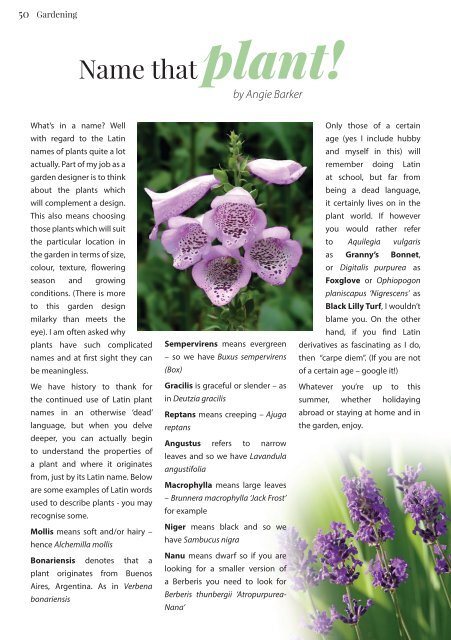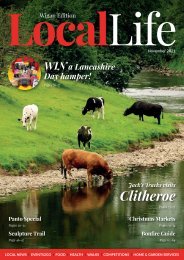Local Life - St Helens - August 2019
St Helens' FREE local lifestyle magazine.
St Helens' FREE local lifestyle magazine.
You also want an ePaper? Increase the reach of your titles
YUMPU automatically turns print PDFs into web optimized ePapers that Google loves.
50 Gardening<br />
Name that plant!<br />
by Angie Barker<br />
What’s in a name? Well<br />
with regard to the Latin<br />
names of plants quite a lot<br />
actually. Part of my job as a<br />
garden designer is to think<br />
about the plants which<br />
will complement a design.<br />
This also means choosing<br />
those plants which will suit<br />
the particular location in<br />
the garden in terms of size,<br />
colour, texture, flowering<br />
season and growing<br />
conditions. (There is more<br />
to this garden design<br />
milarky than meets the<br />
eye). I am often asked why<br />
plants have such complicated<br />
names and at first sight they can<br />
be meaningless.<br />
We have history to thank for<br />
the continued use of Latin plant<br />
names in an otherwise ‘dead’<br />
language, but when you delve<br />
deeper, you can actually begin<br />
to understand the properties of<br />
a plant and where it originates<br />
from, just by its Latin name. Below<br />
are some examples of Latin words<br />
used to describe plants - you may<br />
recognise some.<br />
Mollis means soft and/or hairy –<br />
hence Alchemilla mollis<br />
Bonariensis denotes that a<br />
plant originates from Buenos<br />
Aires, Argentina. As in Verbena<br />
bonariensis<br />
Sempervirens means evergreen<br />
– so we have Buxus sempervirens<br />
(Box)<br />
Gracilis is graceful or slender – as<br />
in Deutzia gracilis<br />
Reptans means creeping – Ajuga<br />
reptans<br />
Angustus refers to narrow<br />
leaves and so we have Lavandula<br />
angustifolia<br />
Macrophylla means large leaves<br />
– Brunnera macrophylla ‘Jack Frost’<br />
for example<br />
Niger means black and so we<br />
have Sambucus nigra<br />
Nanu means dwarf so if you are<br />
looking for a smaller version of<br />
a Berberis you need to look for<br />
Berberis thunbergii ‘Atropurpurea-<br />
Nana’<br />
Only those of a certain<br />
age (yes I include hubby<br />
and myself in this) will<br />
remember doing Latin<br />
at school, but far from<br />
being a dead language,<br />
it certainly lives on in the<br />
plant world. If however<br />
you would rather refer<br />
to Aquilegia vulgaris<br />
as Granny’s Bonnet,<br />
or Digitalis purpurea as<br />
Foxglove or Ophiopogon<br />
planiscapus ‘Nigrescens’ as<br />
Black Lilly Turf, I wouldn’t<br />
blame you. On the other<br />
hand, if you find Latin<br />
derivatives as fascinating as I do,<br />
then “carpe diem”. (If you are not<br />
of a certain age – google it!)<br />
Whatever you’re up to this<br />
summer, whether holidaying<br />
abroad or staying at home and in<br />
the garden, enjoy.


















